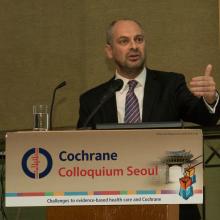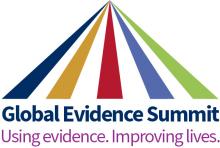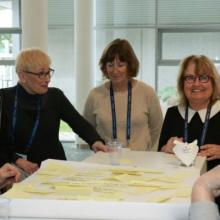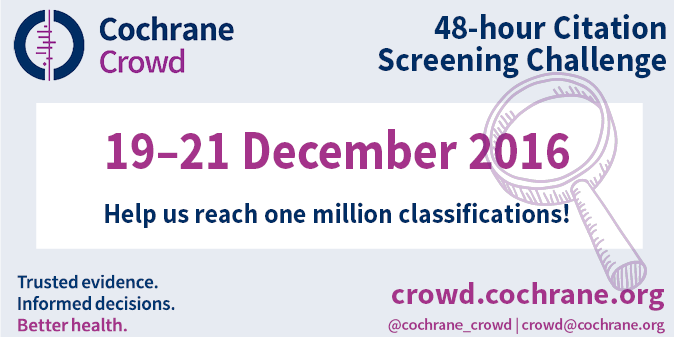Dear colleagues - Happy New Year!
2016: a year of organizational change and growth
For a year that brought us world-changing events, some of you may be glad to see the back of 2016. For Cochrane it has been a very good year - we saw continuity and growth in all our key organizational indicators, and huge progress being made on our major Strategy to 2020 initiatives. Many of these are due to be launched in 2017, bringing significant changes and – we hope - improvements to our products, ways of working, outreach and, most importantly, impact on health decision making by users of Cochrane evidence.
Usage of the Cochrane Library measured through website visits continued to show astonishing growth: 45% in the first nine months of 2016 compared to the same period the year before. As of September 2016 39% of all Cochrane Reviews are freely available worldwide through our ‘green’ and ‘gold’ open access policies, and this number continues to grow. At the same time, income from sales of the Cochrane Library greatly exceeded our annual targets, with royalty revenues increasing by 13.2% in 2016 compared to 2015, giving us the flexibility to continue to invest in the strategic priorities set out in our Strategy to 2020. We also achieved significant fundraising success, attracting our first major grants to support Cochrane Strategy to 2020 initiatives, including a grant of USD$1.15 million from the Bill & Melinda Gates Foundation which will support our Linked Data work.
We also successfully completed significant parts of our organizational reforms in 2016. The Steering Group approved new structure and function plans for Cochrane Review Groups in October. At the same time, Centre and Associate Centre Directors endorsed new detailed responsibilities and accountabilities for geographic-oriented Groups. These legitimize the Cochrane Network concept and introduce new smaller Affiliate Groups that can be set up in existing and new countries. We will implement these changes in 2017, as well as the major governance changes that were a highlight of the year for us. Cochrane’s new Articles of Association, which were unanimously approved by the Annual General Meeting in October, have replaced the Steering Group with a Governing Board, and a switch from a Group-based to an individual membership model, enfranchising thousands more people to vote both for candidates for the Board and on our organizational policies and governance. As you will be aware, the first Board elections to take place under this new model are now underway, and I encourage you to cast your votes for four new members from the 11 excellent candidates standing. We are also finalizing the selection of Cochrane Group representatives on the new Council advisory body to the Board; this group will meet for the first time in April at the Mid-Year Meeting in Geneva.
These developments are, in many ways, just the first fruits of the huge amounts of work we are doing together to deliver our Strategy to 2020 ambitions. Next month we will share with you our detailed projection of what success will look like by 2020 for each one of the 28 strategic objectives. The Governing Board approved these ‘definitions of success’ in December, along with the 2017 Plan & Budget, which is now available for you to read and use. The Plan & Budget provides the framework for all centrally managed activities and spending by the Central Executive Team (CET); and this year shows the amounts allocated to each of the four Strategy Goals. Of the £7 million approved to be spent in 2017, 24% (£1.7 million) will be returned directly to Cochrane Groups via funding programmes for methods development, translations, training, and review production; and also for governance, centralized support to Managing Editors and Information Specialists, and commissioned work for various Strategy to 2020 projects.
Data gathered in 2016 show that Cochrane Group funding continues to remain stable, with strategic support being provided to Groups in Cochrane Canada to assist them achieve longer-term sustainable funding, we hope, in 2017. At the same time, new Cochrane Groups continue to develop, including:
• the launch of our first single-country Network in Brazil with five new Affiliates
• the recognition of dynamic new Fields in the areas of Global Ageing and Rehabilitation
• agreement in December on the formation of a new Cochrane Iran Associate Centre to expand Cochrane’s reach into a region where our influence has previously been very limited.
We anticipate that these new Groups will contribute to an increase in total funding (from £15 million in 2016) attracted by Cochrane Groups to support their work; and my deepest thanks and appreciation for the tireless work of so many of you to secure this funding.
2017: completion and launch of major new initiatives
|
The Strategy to 2020 annual Targets for 2017, which were approved by the Governing Board alongside the Plan & Budget, reflect the continuity of our work over the last three years but also a very exciting time as we complete and launch many of the initiatives and projects we have been working on through this period.
Together, the CET and Cochrane Groups will:
GOAL 1: PRODUCING EVIDENCE
1. Complete the development of RevMan Web and begin phased implementation for Cochrane Reviews.
2. Complete the Transform project.
3. Complete the delivery of a programme of training and accreditation for editors.
GOAL 2: MAKING EVIDENCE ACCESSIBLE
4. Improve the process of producing translations to make it easier for Cochrane translators and editors.
5. Define an organization-wide framework for knowledge translation activities.
GOAL 3: ADVOCATING FOR EVIDENCE
6. Complete the first-phase delivery of an enhanced Cochrane Library in English and Spanish.
7. Host a successful Global Evidence Summit.
GOAL 4: EFFECTIVE AND SUSTAINABLE ORGANIZATION
8. Begin implementation of the approved Cochrane Review Group transformation programme, and finalize remaining proposals for organizational Structure & Function reforms.
9. Launch a Cochrane membership scheme.
10. Complete implementation of the approved governance reforms.
The CET is currently working on developing the Targets into formal projects, and more information will be available soon on the Strategy to 2020 section of the Cochrane Community site.
|
2017 is going to be a critically important year for Cochrane, and one of its highlights will be the Global Evidence Summit (GES) in Cape Town, South Africa, 13-16 September, with four partner evidence organizations. We are in the final stages of developing a compelling and wide-ranging programme of training and workshops - just as at our normal Colloquia - which will complement the new activities and sessions that will be specially designed for the Summit. More details on this programme will follow soon. I very much hope that you are planning to attend as it will give you a unique opportunity to work with and learn from colleagues from other important evidence-using and evidence-producing organizations. We believe the GES will provide the leading event of the year for those interested in evidence-informed policy and practice in health care and other sectors, too.
There is so much to look forward to in the coming 12 months, and whilst the changes that are coming may be, at times, disorientating, we are already seeing in the ways that we measure the output and impact of Cochrane’s work the value of the changes we are making. If you have any questions, comments, or concerns about all that lies ahead, please don’t hesitate to contact me, Editor in Chief David Tovey or any of my Senior Management Team or CET colleagues.
With my very best wishes,
Mark Wilson












